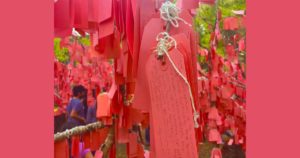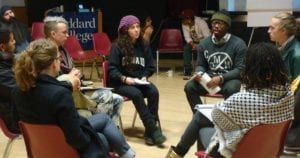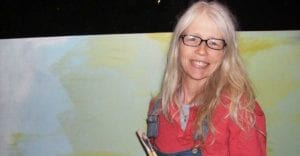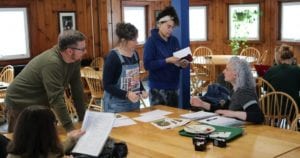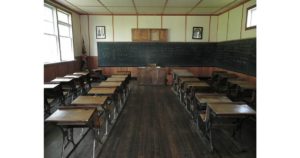 After graduate school, I joined a migration of writers to New York. My homeland was Skokie, a suburb of Chicago, where our mostly old neighbors had just survived the holocaust and I could walk all by myself to their houses to play cards with them. We lived in identical small ranch houses, mine distinguished by being a place where adults spelled out the word “divorce” over my head like profanity and always in relation to other people. There was dinner every night, breakfast every morning, cocktails and television, piano lessons, BBQs on the patio, a set of World Book Encyclopedias and 12 novels, one of which was Gore Vidal’s MYRA BRECKINRIDGE, which I read on the sly when I was 12. Before that, I’d read only library finds about children surviving the holocaust, poetry, and Swiss Family Robinson. There was the comforting sound of lawn mowers on Saturday mornings, the washer and dryer on Monday afternoons, ice cubes clinking in highball glasses every day after 5. But I had anxiety attacks whenever I practiced the piano because I knew that I was not using myself to capacity and my mother was miserable; I would never be able to stay in Skokie forever. I would have to leave. It was a matter of death and life.
After graduate school, I joined a migration of writers to New York. My homeland was Skokie, a suburb of Chicago, where our mostly old neighbors had just survived the holocaust and I could walk all by myself to their houses to play cards with them. We lived in identical small ranch houses, mine distinguished by being a place where adults spelled out the word “divorce” over my head like profanity and always in relation to other people. There was dinner every night, breakfast every morning, cocktails and television, piano lessons, BBQs on the patio, a set of World Book Encyclopedias and 12 novels, one of which was Gore Vidal’s MYRA BRECKINRIDGE, which I read on the sly when I was 12. Before that, I’d read only library finds about children surviving the holocaust, poetry, and Swiss Family Robinson. There was the comforting sound of lawn mowers on Saturday mornings, the washer and dryer on Monday afternoons, ice cubes clinking in highball glasses every day after 5. But I had anxiety attacks whenever I practiced the piano because I knew that I was not using myself to capacity and my mother was miserable; I would never be able to stay in Skokie forever. I would have to leave. It was a matter of death and life.
And so in 1981, I left my homeland and drove in my old Volvo to the new world: New York City. My parents and grandmother stood on the sidewalk and cried as I backed out of the driveway, and kept waving as I turned the corner and East. I arrived in the New World with a shoddy education and what I thought was a fortune: $500 from teaching horseback riding in high school, and an equal amount my father gave me so I could “get started.” I slept on the couch of a friend and searched the bulletin boards for a a job, a sub-let, a roommate, another couch. The Volvo got stolen. I found a place. It was a room in a vast apartment inhabited by other immigrants over the Citarella fish store at 103rd and Broadway. It was a storage room for the owner of the place, where she stashed her parents’ stuff after they died. The stuff came with it. I carved out space among their old clothes, old receipts and old shoes. The streets below were sodden with trash, some of which I salvaged to furnish my corner. Everyone made their own meals at different times in the kitchen where you had to wash a pan before using it and everything was always left out.
I found my first job in the New World: checking coats at The Terrace Restaurant for the Serbo-Croatian owner/chef.
I beat the pavement with my plays.
I found a vintage grocery cart abandoned in the garbage. Hallelujah! Now I could roll my groceries home! I hauled it down the subway steps proudly, discussing my find on the platform with a guy I felt sorry for: the times had obviously been hard on him. The B train came. Everyone got on, but I was waiting for the C and remained. When the doors closed and the train pulled out, the guy I’d been talking to grabbed me and picked me up by my coat-collar, held a knife to my neck and demanded my money. Because I worked for tips and dinner, I had only ones and they burst out of my pockets like confetti. He plucked them out of the air and ran up the stairs. I was so frightened I couldn’t speak—a trait I didn’t know I possessed until then—and he was far away by the time I could climb the stairs and tell a cop.
All that first winter I couldn’t get on the subway. I walked all over the city and sometimes ran if someone frightened me. I often took the middle of the street, thinking it was safer in traffic than alone on a sidewalk. I hid my money all over my body, but kept out some as a decoy in case I was mugged again. I showed up late too many times for work and got fired.
I moved in with friends who had a couch in a loft that had no heat. There were times when the three of us slept in the same bed in order to stay warm. We watched Dynasty and read aloud to each other from The Good Soldier, a book that never seemed to end. We wrote and painted by the glow of a small oven and a rolling radiator. We ate pasta and potatoes and bananas with peanut butter.
I beat the pavement with my plays.
I was frightened to walk home alone at night from the kinds of theatres I went to, where the work was avant-garde and the tickets were pretty much given away. I often ran. There was an artist named Richard Hambleton who spray-painted dark figures of men lurking in doorways, in doorways, and every time I passed one I thought he was real.
I got a new job, where I could warm up.
Now I worked as a personal secretary to a multi-millionairess. On the 6th floor of her Park Avenue building, I managed her servants, her dead first husband’s significant art collection, and her live second husband’s cocaine habit. Occasionally she asked me to take dictation, which required that I sit on her canopied bed with her prize Llasa Apsos while she languished there looking for diets in magazines. She only wore black. Ling, the Chinese cook, told me in Mandarin, which I did not speak, all about how she never gave him a day off, and he had a family; and how back in China he was a librarian and had never cooked a meal in his life until he got this job. Lola, the housekeeper, who was from Guatemala, told me, in Spanish, which I spoke a little, about a night in the rain on a dark road when our employer had fallen asleep at the wheel of her Mercedes and driven into an oncoming car; how she’d jumped from her car screaming and running away, and Lola had had to rescue the children from the back before it burst into flames. And not even a tip at Christmas.
I beat the pavement with my plays.
I was routinely grabbed, pinched, pressed against, flashed and generally molested on 9th Avenue, 52nd Street, and the 6 train. I hated the New World. The wail of sirens at all hours, the grind of garbage trucks, the smell of piss everywhere. I cried every day. I cried after every phone call home. The dog died and I wasn’t there. My grama got sick and I wasn’t there. My mom got sick and I wasn’t there. My dad got sick taking care of my mom and my grama. And I wasn’t there.
It snowed three feet on my birthday and we couldn’t open the bottom door to our building to get out. No one knew anyone to call to dig us out.
I learned to take the subway again. I learned to read on the train.
My employer went to her house on Mustique with Prince Charles. She stayed an extra two months. I forged her signature to pay her bills. And give her live second husband cash for his dealer. I polished her Leonard Baskin with love.
One night I got home from work and there was a big envelope on the splintery table where we ate and wrote and drew. The three of us just stood looking down at it until Francis said aloud: you got it. You got an NEA.
Michael was jealous. I quit my job.
I sprang for a party in the loft and Richard Hambleton came. I did not meet him. We didn’t even know he was there. But the next morning, there was a dark figure of a man lurking drying on the wall of our stairwell.
I realized I was in love with both of my gay roommates and had to move. I moved to an apartment beside a methadone clinic in Staten Island with a Yogi cocaine dealer and heat.
I got a reading of my play in midtown.
My apartment was robbed three times, each time of something I really loved: my walkman, my grandmother’s garnet ring, my FM radio. Anything my mother had just sent.
I learned how to walk down the street.
I learned that it was the middle class which did not prepare me for the streets of New York.
I learned how much money wealthy people waste.
I learned to not want anything nice.
I saw Jack Lemmon play James Tyrone.
I saw Starry Night up close. And Guernica before it left for Spain.
I learned how to drink a Manhattan.
I learned how to second-act an opera.
I learned how to keep my eyes open.
I learned how to bribe a super.
I learned how to pack fast and give things up.
I learned how to deal with an Egyptian landlord.
I moved back to the couch of my friend.
I got a new job: teaching English in a men’s prison.
My students: a man who’d kidnapped Calvin Klein’s daughter, a serial rapist, a forger, a pimp with deformed hands, and countless dealers whose customer base was now corrections officers. It was against the law for the teachers to know what crimes our students had committed, but that always came out in the stories they wrote for my class. My students were grateful for a place to go where they could escape “the population,” and relax for awhile. They cautioned me against hope for them: books and reading and writing and thinking would make them too soft to survive on the streets, so they weren’t going to work too hard. My class was a vacation from having to put on a front all the time to survive.
Every time I crossed through the metal-detectored threshold at the prison, the CO on duty would empty my book-bag. Sometimes he’d pick out something deemed dangerous and I’d have to leave it behind. But I left a lot more than that: my middle-class illusions about justice, race, safety, intelligence, men, fairness, white privilege, good, evil, luck, talent; illusions that had held me prisoner all my life and made me ignorant, laisez-faire, jingoistic, and afraid. Unburdened for a moment, I walked on down the prison hallways to my classroom knowing that, though technically, I’d emigrated to the New World a few years before, I was finally starting out; and it was in the walking itself where I felt, finally, home.


